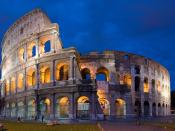Can you ever imagine London without Big Ben, Paris without Arc de Triomphe, Peking without the Summer Palace? Though these metropolises are all facing more urgent requirement for ground than ever before, no one would allow for the sacrifice of those invaluable historical buildings, which are not only precious record of a society's past, but more importantly the emblems of a city, a nation, or the whole human race.
Though buildings are stronger than other important society treasures such as scripts, paintings and documents as to stand against abrasion of time for hundreds or even thousands of years, they are actually as vulnerable in that once destroyed, buildings cannot be restored any more even by the best architects. When the ground on which historic buildings stand is described as "could be better used for modern purposes", modern planners are most possible referring to the good location of such buildings.
As we know, large portion of older buildings are located in the centres of downtown, from which the cities have evolved. As the hub of transportation, politics and commerce, these ground would certainly bring great profit if new commercial centers replaced the old ones. But are they really worthy of the price? Wouldn't it be a tragedy if our children were confused by the historical buildings and relative stories in their text books and the edifices or something else standing there instead? Wouldn't it be a great disappointment if we could only see them on pictures or in dreams?
It's far from enough to describe historical buildings as "valuable record of a society's past". Actually most of them stand for the cities they belong to. Not only citizens take pride in them as the glories their history and master pieces of their acients, but those who have never been...


